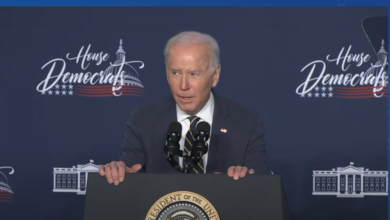House Defense Bill Is Chock-Full Of Items With An Eye Toward Countering China

- Bipartisan lawmakers stressed provisions they said would bolster U.S. defenses against an ever-rising threat from China in the 2024 defense bill, which passed subcommittee markups this week.
- House Armed Services Committee lawmakers worried that China could outmatch the U.S. on technology and naval power.
- “If Chairman Rogers was king for a day we’d have a higher number,” a senior congressional aide, speaking on condition of anonymity to discuss the legislation in detail, told reporters, referring to the $886 billion topline.
The House Armed Services Committee took what it called a hard aim at China in the draft legislation authorizing $886 billion in Department of Defense funding for 2024.
While nodding to the need to address Russian aggression in Europe, House Republicans and Democrats concentrated resource allowances on “countering China” in the annual markup sessions beginning Tuesday. In statements ahead of voting on each subcommittee’s component authorization bills, lawmakers worried China is outpacing the U.S. on technology and naval power, saying the legislation seeks to ensure the U.S. can prevent Chinese aggression and, if necessary, anticipate and defend against a possible Chinese attack on Taiwan or elsewhere.
“With a pacing threat like China, we cannot handicap ourselves any further,” Republican Florida Rep. Mike Waltz, chairman of the Readiness Subcommittee, said in a statement.
The most significant provisions aimed at countering China have to do with submarines and associated munitions, Brent Sadler, a senior research fellow at the Heritage Foundation, told the Daily Caller News Foundation.
“HASC mark-ups indicate a focus on improving naval shipbuilding and industrial base to include workforce, which is long overdue,” Sadler said.
The committee authorized $16.5 billion for up to 13 attack submarines above the Navy’s request for 10, and an amphibious warship for the Marine Corps that the Navy did not want at all. But it relented on a years-long battle between Congress and the Navy to decommission two much-maligned littoral combat ships.
Lawmakers heaped pressure on the Navy to establish a better handle on ship sustainment needs and building capacity, and to submit a fleet plan that meets the threshold for the number of ships Congress wants.
Experts and government watchdogs have repeatedly hammered the Navy and shipbuilding and maintenance contractors for failing to build vessels on schedule and at cost, and then failing to ensure proper upkeep of operating vessels.
“You’re not going to get to [the congressionally mandated 355-ship fleet size] if you’re retiring ships early,” Virginia Republican Rep. Rob Wittman told Defense News. “And if you look at some of those situations, what’s happened is the Navy hasn’t been as rigorous in their maintenance scheduling and efforts there, and when you aren’t rigorous with that, your ships wear out faster.”
The proposed shipbuilding account is $300 million higher than enacted for 2023, representing the highest shipbuilding topline in U.S. history, Democratic Rep. Joe Courtney of Connecticut said in an emailed press release.
In an effort to incentivize contractors and keep costs down, the House approved a type of contracting authority that allows DOD to guarantee payments for successive years without depending on authorization in the following years’ defense spending bills. The procurement authority would apply to the submarines and the $351.6 million set aside for 550 MK-48 torpedoes, Defense Daily reported.
Courtney touted the multiyear procurement provision for saving taxpayers hundreds of millions of dollars since the program was first tried out in 2015.
The bill extends the Pacific Deterrence Initiative, a program enacted in 2021 and dedicated to prioritizing projects thought to best strengthen deterrence against China as a “pacing challenge” at $9.7 billion, a senior congressional aide, speaking on condition of anonymity to discuss the legislation in detail, told reporters Monday in advance of the markup hearings. The Biden administration requested more than half of one billion fewer dollars for the PDI at $9.1 billion.
But, to fund priorities related to the Indo-Pacific, the House had to make tradeoffs against other programs, the aide explained.
“You’ll see that throughout our bill, especially with the Pacific Deterrence Initiative – divesting from some of these old legacy platforms that are not survivable in the Indo-Pacific region against a very capable adversary. We’re really taking a hard look and making some tough choices on things we don’t think we need anymore, as we’re confronting a 21st-century military,” the aide said.
It’s vital we invest in our military systems and programs in order to maintain overmatch and deterrence capabilities in the face of China’s aggression.
The FY24 NDAA is laser-focused on boosting deterrence, strengthening our defense, and preventing CCP espionage. pic.twitter.com/Ylg1E0Z3h3
— Armed Services GOP (@HASCRepublicans) June 15, 2023
The bill deactivates the Air Force’s troubled ARRW hypersonic missile program, according to funding tables in the Chairman’s mark. But, GOP Colorado Rep. Doug Lamborn emphasized the need to continue funding hypersonics research and development at $43.4 million for the Army and $401.5 million for the Air Force’s hypersonic attack cruise missile as one of his “top priorities.”
“The mark will accelerate the development of offensive and defensive hypersonic capabilities. This is one area where the United States severely lags behind China and Russia,” Lamborn said.
House authorizers said they hope to build up the Army and Air Force’s capabilities to match the unique demands of Indo-Pacific operations.
“The Army needs a new strategy that looks beyond a potential European conflict and focuses instead on fully providing the capabilities required to meet the Indo-Pacific’s challenges of distance and depth,” Wittman explained. The Army has a role to play in long-range offensive capabilities, missile defense, logistics and communications in support of the other military departments, he added.
Sections focused on readiness include provisions that would commission reports on “fuel supplies, refueling capabilities” and “ship sustainment” following reports of logistical shortfalls that could prove the U.S. Navy’s undoing if forced to take part in a Pacific conflict. It also asks for reviews of DOD’s ability to bring reserve troops into a potential fight in the Pacific and ways to pre-position weapons and supplies in the Indo-Pacific to be ready at short notice.
Other budget items support moves within DOD to focus intelligence efforts on China and the Pacific, according to GOP Rep. Jack Bergman of Michigan, chair of the Intelligence and Special Operations subcommittee. Signaling a deepening shift toward China, it requires the military to review personnel and structure demands with a view of focusing more special operations forces on China-related missions.
Another provision asks DOD to identify concerns Beijing seeks to co-opt any strategic transportation hubs necessary to conduct military operations through the Belt and Road Initiative, or the text shows.
Another category of authorizations aims to reduce dependence on China for raw materials used in defense technologies, including instructions for a report on DOD’s strategy for establishing a steady domestic source of critical minerals and metals, the bill shows.
Members wanted to “take a look at any situation where the [Chinese Communist Party] was looking to influence, be the aggressor or overtake any of our allies or partners,” the aide said.
Authorization bills define the terms and limits of a department’s spending and often give instructions to complete studies and provide reports and updates on agency programs.
If enacted, the bill would block private schools owned by CCP-affiliated individuals or companies from operating JROTC programs. It also singles out any Chinese overseas cultural institution with direct or indirect financial ties to the CCP as “Confucius Institutes,” Chinese organizations that seek to curry favor for the CCP, the bill text shows.
The Biden-McCarthy debt limit agreement capped what the House committee could authorize for defense spending at just a 3.3% increase over fiscal year 2023 levels, less than what many lawmakers had hoped for, according to the aide.
“If Chairman Rogers was king for a day we’d have a higher number,” the congressional aide said.
Rogers indicated earlier in June the committee might get around McCarthy’s debt agreement with a supplemental spending bill to further address the threat from China, Defense News reported.
Content created by The Daily Caller News Foundation is available without charge to any eligible news publisher that can provide a large audience. For licensing opportunities of our original content, please contact licensing@dailycallernewsfoundation.org




